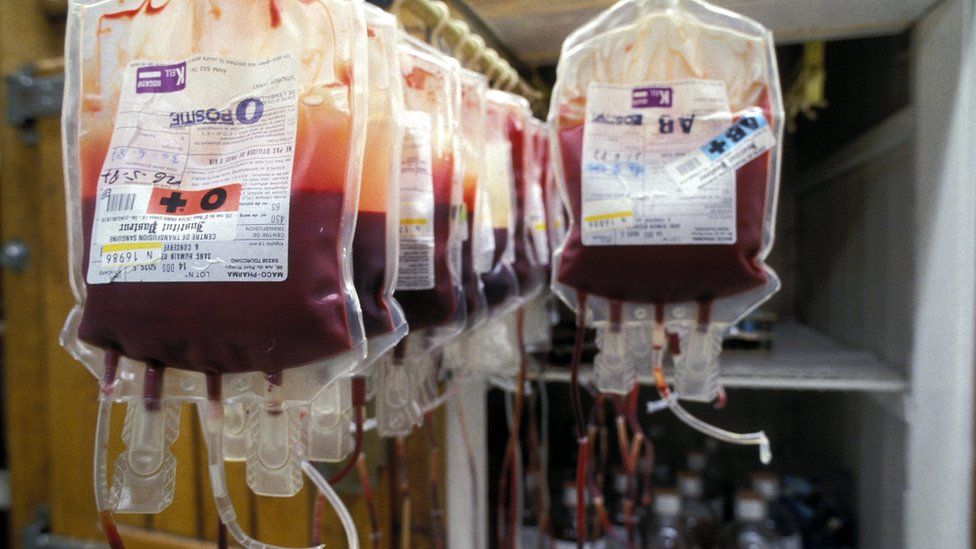Infected blood transfusions killed 1,820 in UK, study estimates
- Published

An estimated 1,820 people died in the UK after being given contaminated blood transfusions between 1970 and 1991, a report has found.
The authors calculated that 26,800 people - possibly more - were probably infected with hepatitis C after being given the donated blood during childbirth or a hospital operation.
The findings were published by the public inquiry into the scandal.
The government agreed last month to pay compensation to victims.
In what has been called the worst treatment disaster in the history of the NHS, one group infected was given regular injections of a contaminated treatment for blood-clotting disorder haemophilia in the 1970s and 1980s.
At least 3,650 patients in that group were infected with HIV, hepatitis C or both. It is thought more than 1,500 have died as a result.
A second group was exposed to hepatitis C though a transfusion of donated blood in surgery or childbirth.
Hepatitis C primarily affects the liver and, left untreated, can lead to cirrhosis or cancer and may require a full liver transplant.
It is sometimes known as the silent killer because most people with the disease do not realise they are infected until symptoms develop decades later.
Body Shop founder Anita Roddick died in 2007 of a brain haemorrhage linked to hepatitis C
Body Shop founder Dame Anita Roddick died in 2007 of a brain haemorrhage - a rare complication of hepatitis C, which she said she had contracted after being given a contaminated transfusion while giving birth to her daughter in 1971.
The long period between infection and symptoms appearing makes it difficult to know how many people were infected through a transfusion in the 1970s and 1980s, before it became possible to screen blood donations for the virus.
New modelling for the public inquiry estimated that between 21,300 and 38,800 people were infected after being given a transfusion between 1970 and 1991, with a central estimate of 26,800.
The study, by a group of 10 academics commissioned by the public inquiry, external, calculated that 1,820 of those died as a result, although the number could be as high as 3,320.
Its findings were based on the rate of hepatitis C infection in the population, the number of blood donations made over that time, the survival rate of the disease and other factors.
It found at least 79 and possibly up to 100 people also contracted HIV through donated blood, based on data provided by the UK Health Security Agency (UKHSA), with most infections between 1985 and 1987.
It said 67 people in that group had now died, although there was no data confirming the causes of death.
Danielle Mullan's mother, Marie Cromie, was given a blood transfusion in the 1980s after giving birth to her son.
All blood donated in the UK is now screened for HIV and different forms of hepatitis, external as well as diseases such as syphilis.
The public inquiry into the infected blood scandal began taking evidence in 2019 and is expected to publish its final report in 2023.
In August the government awarded more than 3,000 surviving victims interim compensation payments of £100,000 each, to be paid urgently due to the extremely high death rate of survivors.
Related Topics
- Published17 August 2022
- Published17 August 2022